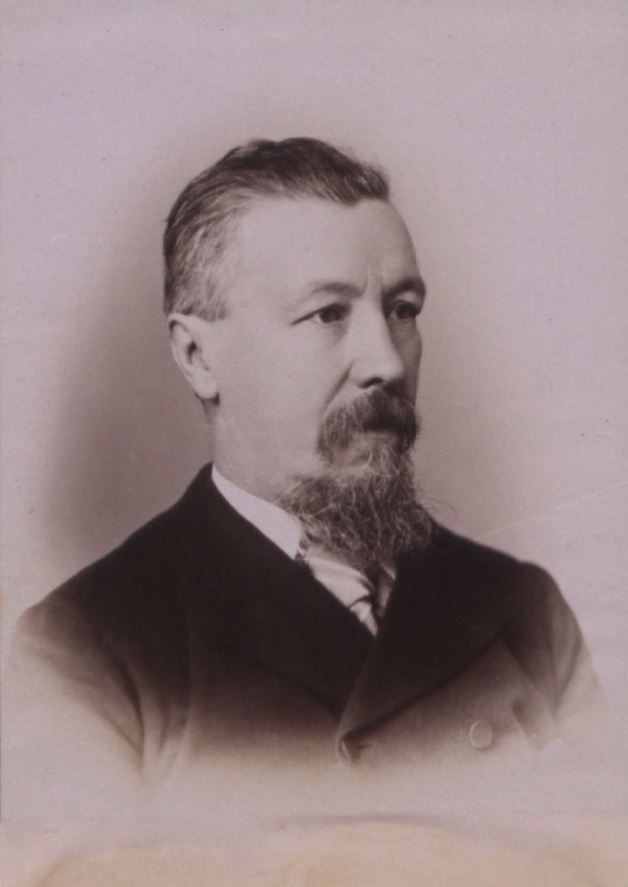
Edward Winter
Information on chess book sales is rarely published. In a letter to the BCM (September 1932, page 402) John Keeble wrote:
‘In 1899 our much loved chess master, J.H. Blackburne, published his Games at Chess, selected, annotated and arranged by himself. This work was edited in an excellent way by P. Anderson Graham, and, I think, sold at ten shillings per copy. In August 1914 Mr Blackburne told me 3,001 copies of the book were printed, and up to that date 2,900 had been sold. The remainder were eventually disposed of, so that the book brought in £1,500, and must have made a profit.’
The author (‘S’) of an earlier BCM article then added to Keeble’s letter the consideration that the total royalties (presumably 10-15%) shared by Blackburne and Graham were thus not likely to have exceeded £150 or £225. In fact, the sums would have been smaller by one quarter; the selling price was 7/6 (BCM, December 1899, page 500).

Joseph Henry Blackburne (C.N. 9296)
(1538)
Yasser Seirawan (Seattle, WA, USA) informs us that the book Bobby Fischer Teaches Chess (first published in 1966) has now sold over a million copies. The source of this information is the latest royalty statement received by a co-author, Stuart Margulies.
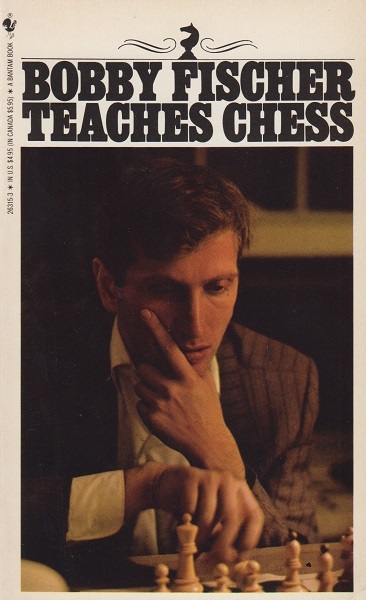
We have occasionally touched on the topic of chess book sales, but it would seem impossible to list authoritatively the best-selling titles, past or present. Is Fischer the only world champion to have a book sell a million copies?
(2267)
In 1987, C.N. 1406 reported that the back cover of the most recent Penguin edition said that since 1954 The Game of Chess by Harry Golombek ‘has sold over a million copies’. We have pre-1986 editions whose back-cover blurbs state ‘over 190,000 copies’ and ‘over 300,000 copies’. If taken literally, those figures give the improbable impression that between 1974 and 1986 the book sold about 700,000 copies.
From the back cover of The Official Blue Book and Encyclopedia of Chess by Kenneth Harkness (New York, 1956):
‘Mr Harkness is the co-author [with I. Chernev] of An Invitation to Chess – the largest-selling chess book in the history of the game.’
(2309)
On page 129 of a recent (and decidedly ramshackle) book The Art of Bisguier by A. Bisguier and N. Berry (Hazel Crest, 2003) the former asserts that ‘the best selling chess book of all time’ was Gligorić’s work on the 1972 Spassky v Fischer match. Bisguier states that ‘the English-language version alone sold over 200,000 copies’.
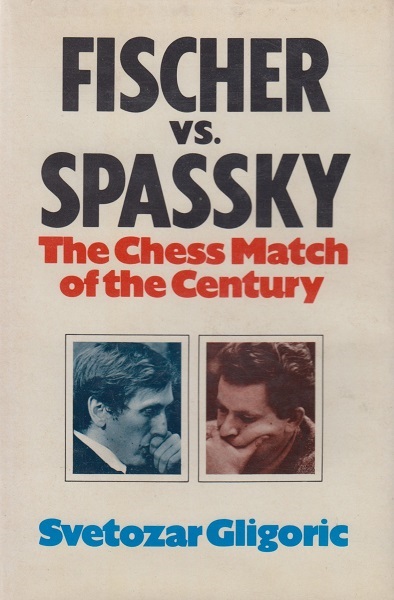
(2956)
Page 181 of 2010 Chess Oddities by A. Dunne (Davenport, 2003) affirms:
‘The top selling chess book of all time is Lasker’s Manual of Chess.’
That is the entire item, the reader being offered not one word of corroboration or other information. So why would such an improbable claim be made? All we can say is that on page 198 of the 1984 edition of The Book of Chess Lists A. Soltis asserted that the Lasker book was the best-selling chess title of Dover Publications, Inc.
(3107)
Concerning the feature article on Edward Lasker v George Thomas we now note that Lasker also published the game on pages 216-217 of the second edition of his book Schachstrategie (Leipzig, 1914). Remarkably, this yields a ninth version of the first nine moves: 1 d4 f5 2 Nf3 e6 3 Nc3 Nf6 4 Bg5 Be7 5 Bxf6 Bxf6 6 e4 fxe4 7 Nxe4 b6 8 Ne5 O-O 9 Bd3 Bb7. In the table of contents (page viii) the game was mysteriously dated 1904.
The game-score was not included in Lasker’s Chess Strategy (London, 1915), which was based on that second German edition.
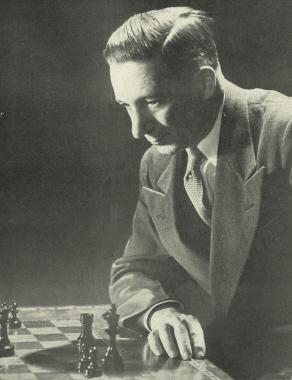
Edward Lasker (front cover, Chess Review, June 1950)
Lasker described the success of the book in an article on page 7 of the March-April 1943 issue of the Chess Correspondent:
‘I believe my book Chess Strategy, the sale of which (between 40,000 and 50,000 copies) exceeded that of any other chess book, achieved its success solely because for the first time it offered the student a real theory of the game which they could apply to any position, according to their more or less thorough grasp of the general strategic principles explained in the book.
I remember that in reviewing that book the great Schlechter, with whom Emanuel Lasker had just barely drawn his match for the world championship, called the teaching method I employed so superior to any used previously that he hoped it would be adopted by all future chess authors. This honor of imitation has indeed been conferred upon me by most authors who later wrote again on chess strategy or tactics, including Capablanca and Nimzowitsch, the former doing it in a more superficial, the latter in a more profound, manner. At any rate, books which offered a theory consisting of opening collections became a matter of past history.
The fundamental innovation I introduced was to teach judging a position by the permanent or transitory form of the pawn skeleton, the mobility which could be given to the various pieces, and weighing of weak and strong points in forming all decisions.’
(5172)
An addition comes from page 202 of The Sorcerer’s Apprentice by D. Bronstein and T. Fürstenberg (London, 1995), in a text by Boris S. Vainstein originally published in the February 1984 issue of 64:
‘David Bronstein wrote first of all about chess as an art. His book International Grandmaster Tournament, (Candidates’ Tournament, Neuhausen/Zurich 1953, T.F.) of which more than 300,000 copies were sold in this country alone, is not a collection of chess games with commentaries but a real literary work.’
The passage is on pages 226-227 of the revised and expanded edition of The Sorcerer’s Apprentice (Alkmaar, 2009).
(6592)
Frank Brady (New York, NY, USA) wonders whether his new biography of Bobby Fischer, Endgame, is the first chess book ever to enter, upon publication, a bestseller list (number 31 on the New York Times list).
He informs us that editions of his earlier Fischer work, Profile of a Prodigy, have sold more than 100,000 copies over the years.
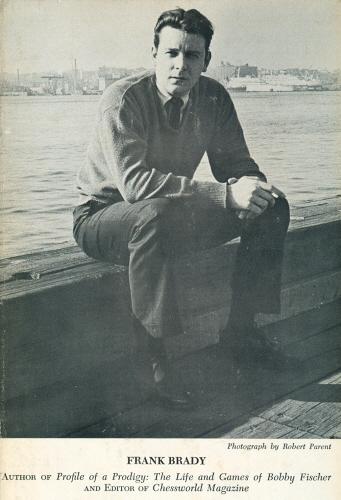
Back cover of the dust-jacket of Profile of a Prodigy (London, 1965)
(6964)
‘One of the chess books of the century’ was discussed by C.J.S. Purdy on page 140 of Chess World, 1 June 1948. ‘We have searched for some fault so that our review should not be all praise, but we have searched in vain. No, we must congratulate the authors on a brilliant idea executed with meticulous attention to every detail.’
Purdy also wrote:
‘... the ordinary beginner’s book plunges into a slough of dull verbiage. But how can you explain chess without words?
Well, the miracle has been accomplished as far as is humanly possible in Invitation to Chess by Kenneth Harkness and Irving Chernev.’
The book, based on material which had appeared in Chess Review, was first published by Simon & Schuster, New York in 1945, and an advertisement on the inside front cover of the June-July 1945 Chess Review called it ‘the most revolutionary chess primer ever published’. The book’s early sales were reported in a full-page advertisement on page 9 of the November 1945 Chess Review. The relevant half of that page:
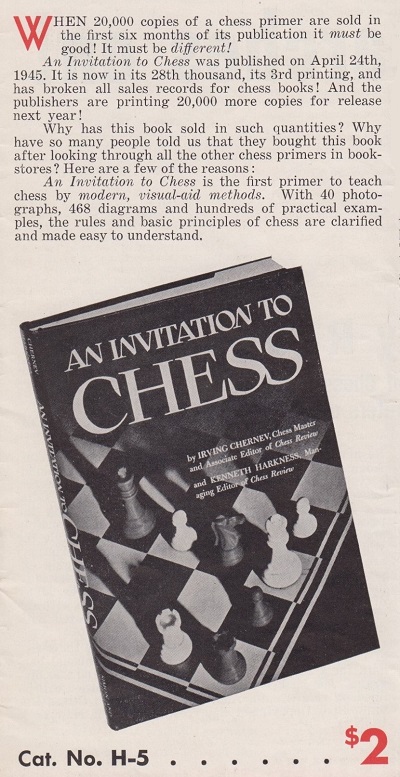
An Invitation to Chess was also published by Faber and Faber Limited, London in 1947.
(9212)
Capablanca Goes Algebraic shows these two documents:
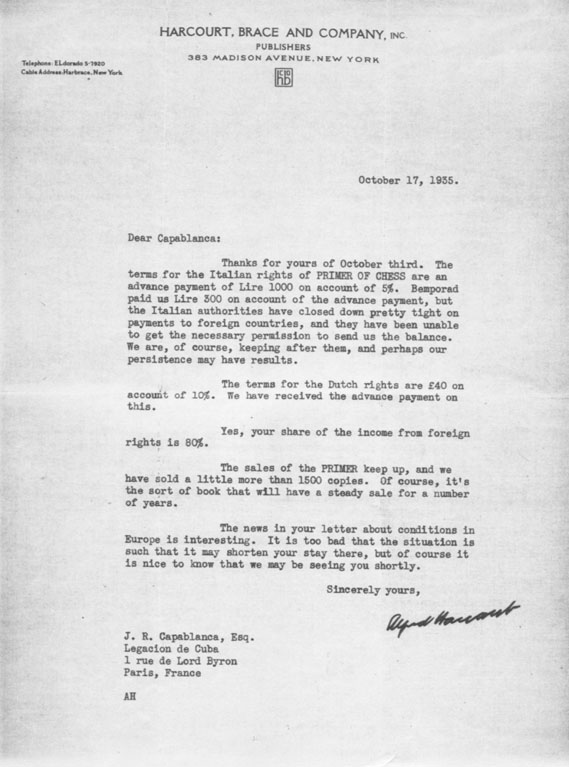
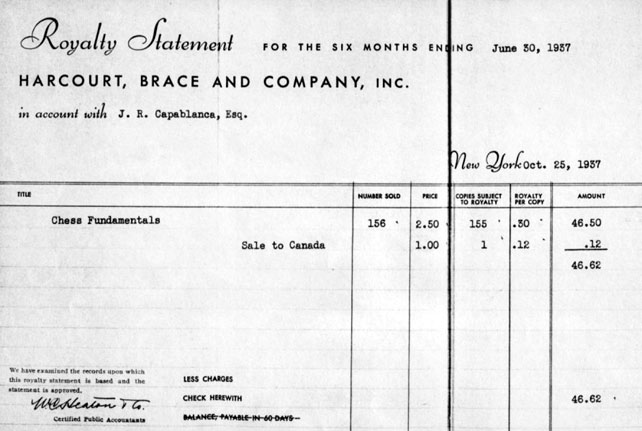
The inside front cover of the October 1972 CHESS stated that three books on the Spassky v Fischer match, by Alexander, Gligorić and Horowitz/Reshevsky, ‘were on sale in Britain within a fortnight of the close of play’. Alexander’s was considered the best: ‘There is ten times as much really original analysis as in the other two books put together.’
A letter from C.J.S. Purdy dated 22 October on pages 45-46 of the November 1972 CHESS commented:
‘I question your remark that there are three books in English on the Reykjavik match. There is a fourth, How Fischer Won, by me (echo of my 1935 book How Euwe Won). Fantastically, it was already out of print (a 14,000 edition) when your October number appeared. It went out of print in one week. The only batch sent to Europe was 100 copies airfreighted to Skopje. They did not arrive and have not yet been traced. A much revised and augmented version will have been printed when you receive this, re-titled Genius Crowned.’
We are aware of no publication by Purdy of that name.
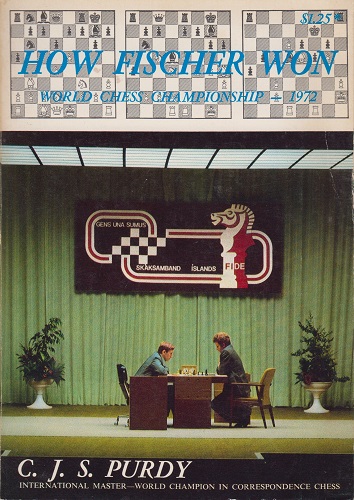
Purdy brought out an eight-page supplement, Post-Mortem 1976 to Fischer-Spassky 1972. A sample page:
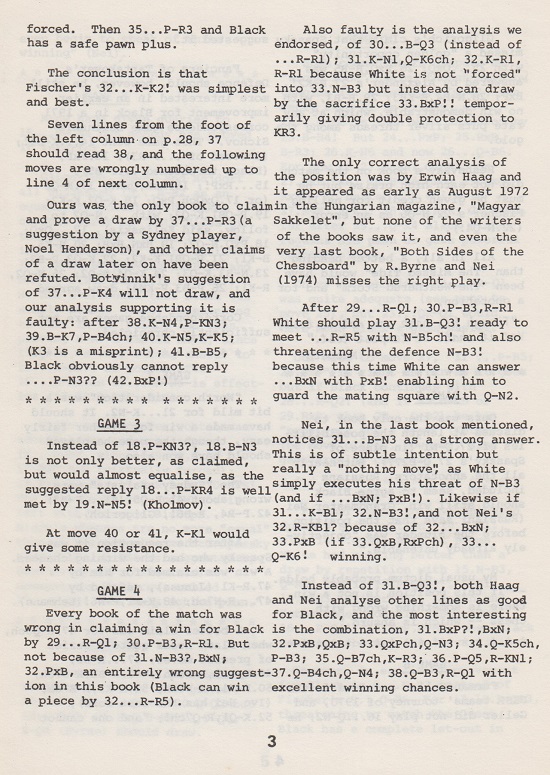
(10983)
The University of Massachusetts Amherst holds a memorandum dated 29 November 1972 written by Mark H. McCormack, the founder of the International Management Group. He had been informed by Stanley Rader of receipt of ‘$200,000 in royalties since the Iceland chess match on Bobby’s eight-year-old book’.
The respective publication dates of Bobby Fischer Teaches Chess and My 60 Memorable Games were 1966 and 1969.
(10987)
Although many websites have historical currency converters purportedly able to show today’s equivalent of, for instance, Morphy’s fee for his New York Ledger column, the London Rules purse, or the prize-money for the 1972 Spassky v Fischer match, the results may vary wildly according to the criteria used. Is there a consensus among economists as to the best way of using such on-line tools, if at all?
Readers of books by Ely Culbertson will see, regarding bridge, far more references to money and to sales of books/magazines – and much higher figures – than exist in the chess world. As a further illustration, we quote some passages from Culbertson The Man Who Made Contract Bridge by John Clay (London, 1985):
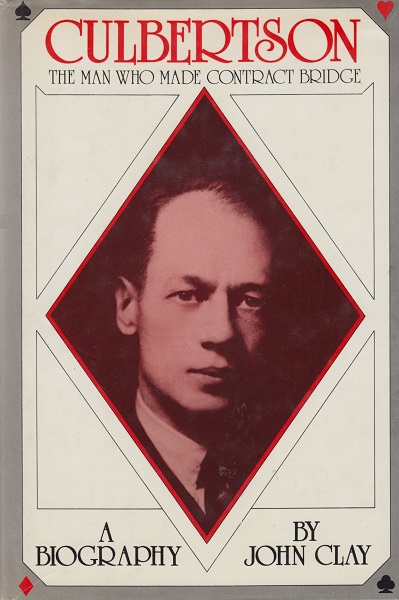
Addition on 1 September 2022:
James Eade (Menlo, CA, USA) informs us that since it was first published in 1996 his Chess for Dummies is estimated to have sold well over one million copies with respect to the English-language book alone (of which there have been four editions). It sold 90,000 copies in its first nine months, and there was a tripling of sales when The Queen’s Gambit was aired by Netflix in 2020.
Addition on 7 September 2023:
Regarding Chess: 5334 Problems, Combinations, and Games by László Polgár (various editions), his daughter Susan wrote in a tweet dated 27 February 2023:
‘Enjoy! I wrote that when I was a teenager. Because I was under the legal age, my father had to front his name. It is the 2nd best selling chess book of all time after Bobby Fischer Teaches Chess. Probably a million + copies have been sold.’
We are grateful to the Cleveland Public Library for the imprint pages of the two editions (1994 and 1995) which it possesses:
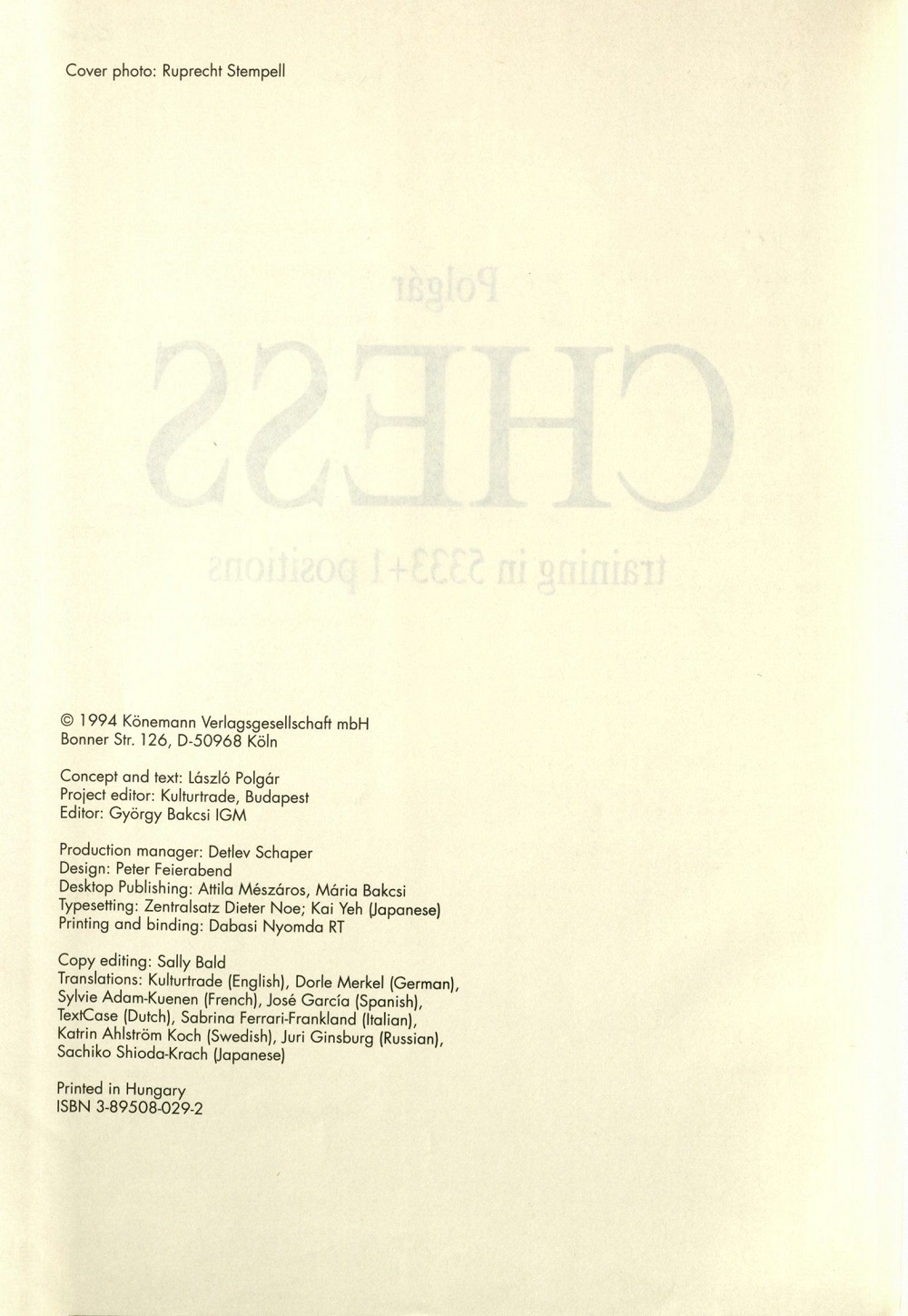
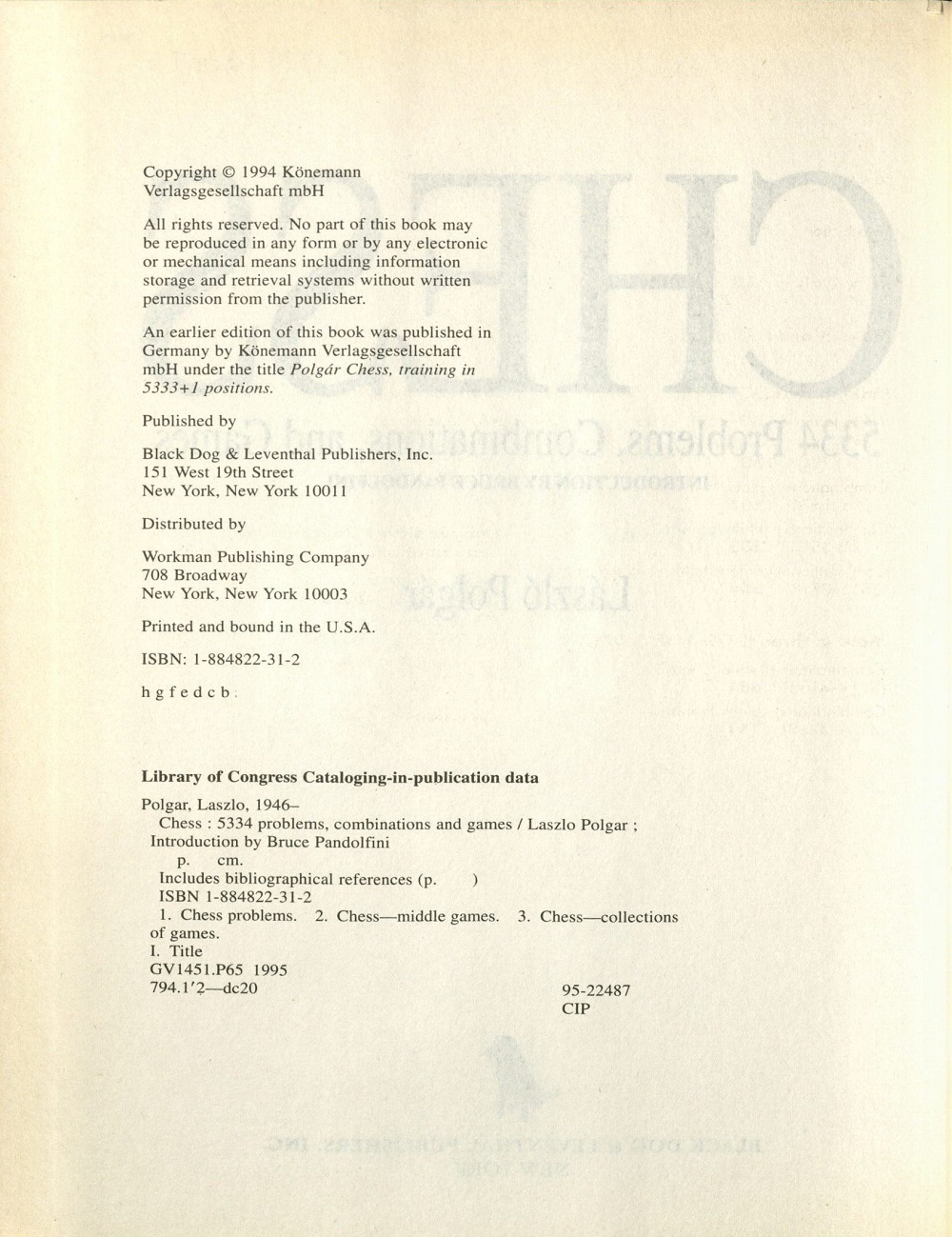
Susan Polgar was born in 1969.
An addition to Chess Book Sales is How to Win at Chess by Levy Rozman (various editions, 2023). Its status is demonstrated by exceptionally high rankings on, notably, Amazon.com and the New York Times bestseller list. The book has been translated into a number of languages.
Levy Rozman’s YouTube channel, ‘GothamChess’, currently has 6.5 million subscribers.
(12172)
To the Chess Notes main page.
To the Archives for other feature articles.
Copyright: Edward Winter. All rights reserved.